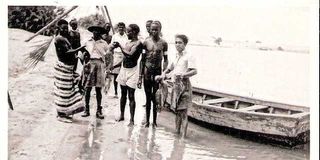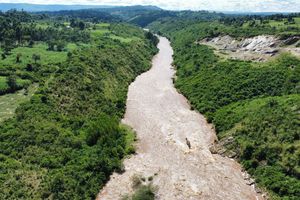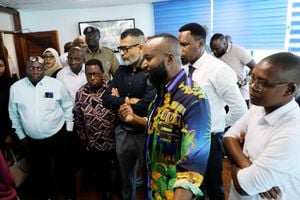
Mervyn Maciel (right) with fishermen on the shores of Lake Turkana in this picture taken in the late 1940s when he worked in Lodwar.
Having recently celebrated my 95th birthday, and with my memory still intact, I am keen to record some events during my 20-year service in the Kenya Civil Service in this new series.
For readers who did not follow my previous series for the Weekly Review, I joined the colonial-era Civil Service in 1947, working mostly in the provincial administration. I started as a clerk and left as an executive officer in the Ministry of Agriculture. Over the years I worked in Mombasa, Voi, Kisii, Lodwar, Marsabit, Kitale and Kapenguria among others.
My parents were originally from Goa, India but I was born in Nairobi. My mother, Josephine Maciel, died at childbirth while my father Mathias Maciel, my stepmother and three young siblings were the victims of the ill-fated ship S.S. TILAWA (sometimes referred to as the forgotten Indian Titanic), sunk by the Japanese Navy in 1942 during World War II.
I would like to start this new series with my time in sweltering hot Turkana where I was stationed at Lodwar in the late 1940s
The District Commissioner (DC) at the time was Leslie Whitehouse, a middle-aged Englishman, who having experienced working in Maasailand felt quite at home in this hot and dusty lava-strewn wilderness. He had a fiery temper, was feared by locals and officials alike, and was determined never to leave the district he regarded as his very own. However, he was fair in all his dealings, and I got on very well with him.
One incident that I have never forgotten 75 years later was during a tour by a Mr Watney, who was a visiting DC from neighbouring Moroto in Uganda. He was holidaying with his wife in the Lake Turkana (formerly Lake Rudolf) area.
The District Officer was on safari at the time and the only remaining staff in the boma were the Goan District cashier and me. Because of the plague of flies and mosquitoes, we were housed in insect-proof cabins upstairs. It so happened that on one night, almost at midnight, I heard a truck approaching from the Lake Turkana.
I jumped out of bed, came downstairs and was met by the Turkana DC’s driver, Zadok. He looked worried and handed me a note written by his boss. When I asked Zadock what the trouble was, he immediately replied: “Mamba na kwishakula mkono ya Bwana DC ya Moroto!” (“a crocodile has bitten off the Moroto DC’s hand!”)
In his note to me, Mr Whitehouse had described what had happened and wanted me at dawn to alert the hospital at Kitale, order a light aircraft which was to pick up the doctor before heading directly for Lodwar airstrip. I immediately replied to the DC’s note assuring him that I would see to everything and sent driver Zadock back to the lakeshore. This must have been quite a worrying time for everyone, not least of all Mr Watney’s wife!
Early the next morning, I got the Post & Telegraphs operator to send a telegram ordering the aircraft from Nairobi and also alerting the Medical Officer at Kitale to stand by to be picked up — having now explained what had happened — and to carry whatever medical equipment he needed. Meanwhile, I also arranged for a drum of aviation fuel to be available at the airstrip.
Fortunately, all went off well, and I was pleased to see the wounded Moroto DC and his wife eventually take off for Nairobi.
Mr Whitehouse, the Turkana DC, thanked me for all I had done, and weeks later, he received a ‘thank you’ letter from Mrs Watney for his help and asking him to pass her thanks to me too. I was so pleased that all had ended well.
I also realised that those of us working in outlying stations such as Turkana were not governed by normal office hours that applied to those working in places like Nairobi or Mombasa. We were likely to be called in an emergency at any hour of the day or night – but for this, we were always rewarded with a trip to Fergusson’s Gulf at Lake Turkana where we could relax!
This is one of the rare occasions I have never forgotten I was called upon to undertake duties well outside my normal calling!










